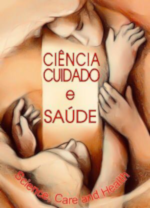Knowledge, attitudes and practices related to COVID-19 in patients undergoing antineoplastic treatment: a cross-sectional study
Abstract
Objective: to analyze the level of knowledge, attitudes, and practices of patients undergoing antineoplastic treatment during the COVID-19 pandemic and relate them to sociodemographic and clinical characteristics. Method: a cross-sectional study with patients from a public hospital in São Paulo, Brazil. Data collection was carried out between August and December 2020, and included three instruments for collecting sociodemographic and clinical data, and a questionnaire to measure knowledge, attitudes, and practices. Data were analyzed using descriptive and inferential statistics. Results: of the 134 patients, the mean age was 58 years; 57.5% were women, 59% had not completed high school; 53.2% had a family income of less than three minimum wages; and 51% had IV disease of disease. The mean number of correct answers in knowledge was 59%, and more errors were observed among patients with lower levels of education and income. In attitudes, 78.4% believed that COVID-19 would be controlled and 89.6% that they would find adequate treatment if they became infected. In practices, 75% practiced social distancing and 96.3% used masks. Conclusion: the lower number of years of education and low family income were associated with a lower level of knowledge. The need to seek strategies to formulate specific health education policies for this population is reaffirmed.
Downloads
References
Zhang JJ, Dong X, Cao YY, Yuan YD, Yang YB, Yan YQ, et al. Clinical characteristics of 140 patients infected with SARS-CoV-2 in Wuhan, China. Allergy. 2020;75:1730-41. doi:10.1111/all.14238.
Ji HL, Zhao R, Matalon S, Matthay MA. Elevated plasmin (ogen) as a common risk factor for COVID-19 susceptibility. Physiol Rev. 2020;100:1065-75. doi:10.1152/physrev.00013.2020.
Lambertini M, Toss A, Passaro A, Criscitiello C, Cremolini C, Cardone C, et al. Cancer care during the spread of coronavirus disease 2019 (COVID-19) in Italy: young oncologists’ perspective. ESMO Open. 2020;5:e000759. doi:10.1136/esmoopen-2020-000759.
Yu J, Ouyang W, Chua MLK, Xie C. SARS-CoV-2 transmission in patients with cancer at a tertiary care hospital in Wuhan, China. JAMA Oncol. 2020;6(7):1108-10. doi:10.1001/jamaoncol.2020.0980.
Zhang L, Zhu F, Xie L, Wang C, Wang J, Chen R, et al. Clinical characteristics of COVID-19-infected cancer patients: a retrospective case study in three hospitals within Wuhan, China. Ann Oncol. 2020;31(7):894-901. doi: https://doi.org/10.1016/j.annonc.2020.03.296.
Casanova M, Bagliacca EP, Silva M, Patriarca C, Veneroni L, Clerici CA, et al. How young patients with cancer perceive the COVID-19 epidemic in Milan, Italy: is there room for other fears? Pediatr Blood Cancer. 2020;67:e28318. doi:10.1002/pbc.28318.
Ning Y, Ackula H, Jindal V, Li M, Li P, Siddiqui AD. Knowledge, attitude and practice in cancer pain management: a survey study among attending physicians, residents and nurses. J Clin Oncol. 2019;37(15):e18278. doi:10.1200/JCO.2019.37.15_suppl.e18278.
Zhong BL, Luo W, Li HM, Zhang QQ, Liu XG, Li WT, et al. Knowledge, attitudes, and practices towards COVID-19 among Chinese residents during the rapid rise period of the COVID-19 outbreak: a quick online cross-sectional survey. Int J Biol Sci. 2020;16(10):1745-52. doi:10.7150/ijbs.45221.
Beaton DE, Bombardier C, Guillemin F, Ferraz MB. Guidelines for the process of cross-cultural adaptation of self-report measures. Spine. 2000;25(24):3186-91.
Brasil. Ministério da Saúde. Como se proteger [Internet]. Brasília: Ministério da Saúde; [citado em 2024 nov 28]. Disponível em: https://www.gov.br/saude/pt-br/assuntos/covid-19/como-se-proteger.
Rios-González CM. Knowledge, attitudes, and practices towards COVID-19 in Paraguayans during the outbreak period: a quick online survey. Rev Salud Publica Parag. 2020;10(2):17-22. doi: https://doi.org/10.18004/rspp.2020.diciembre.17.
Lemos DRQ, Neto RJP, Perdigão ACP, Guedes IF, Araújo FMC, Ferreira GE, et al. Risk factors associated with the severity and deaths caused by influenza during the pandemic Influenza A(H1N1) 2009 in a tropical/semi-arid region of Brazil. J Health Biol Sci. 2015;3(2):77-85. doi: http://dx.doi.org/10.12662/2317-3076jhbs.v3i2.165.p77-85.2015.
Holden CE, Wheelwright S, Harle A, Wagland R. The role of health literacy in cancer care: a mixed studies systematic review. PLoS One. 2021;16(11):e0259815. doi:10.1371/journal.pone.0259815.
Duarte LS, Shirassu MM, Atobe JH, Moraes MA, Bernal RTI. Continuity of health care for chronic diseases in the state of São Paulo during the COVID-19 pandemic. Saúde Debate. 2021;45(2):68-81. doi:10.1590/0103-11042021E205.
Malik A, Bashir F, Mahmood K. Antecedents and consequences of misinformation sharing behavior among adults on social media during COVID-19. Sage Open. 2023;13(1):21582440221147022. doi:10.1177/21582440221147022.
Ichisato SMT, Oliveira RS, Salci MA. O compromisso da ciência em estudar o comportamento da Covid-19 a longo prazo. Ciência Cuid Saúde. 2021;20:e61430. doi:10.4025/cienccuidsaude.v20i0.61430.
Maringe C, Spicer J, Morris M, Stevenson M, Rachet B, Forbes L, et al. The effect of delays on survival in cancer patients: a systematic review and meta-analysis. BMJ. 2020;371:m4087. doi:10.1136/bmj.m4087.
Copyright (c) 2025 Ciência, Cuidado e Saúde

This work is licensed under a Creative Commons Attribution-NonCommercial 4.0 International License.





















